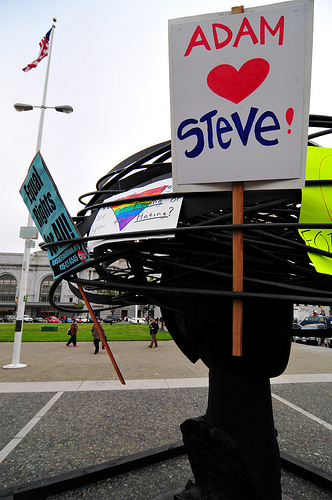 A recent CBS News article discussed the decision by North Carolina voters to change the North Carolina state constitution this week to ban gay marriage. The law of the land now reads that the only legally valid domestic partnership in the state is marriage between a man and a woman. The constitutional amendment received broad support, passing 61% to 39%, and made the state the 29th to institute such a ban.
A recent CBS News article discussed the decision by North Carolina voters to change the North Carolina state constitution this week to ban gay marriage. The law of the land now reads that the only legally valid domestic partnership in the state is marriage between a man and a woman. The constitutional amendment received broad support, passing 61% to 39%, and made the state the 29th to institute such a ban.
To some the amendment seemed unnecessary given that the state already had a gay marriage ban in place. The new amendment makes it even more difficult for lawmakers to ever attempt to change the law. It also goes further than the previous ban by preventing North Carolina local governments from extending health benefits to the domestic partners of their employees.
The lead up to the vote saw public pleas from Bill Clinton and President Obama. Supporters of gay marriage out-raised and out-advertised their opponents in the lead up to the vote, emphasizing in TV ads that the amendment could also even have repercussions for unmarried straight couples because of its vague language. The anti-amendment coalition raised more than $2 million. The pro-amendment crowd on the other hand, known as Vote for Marriage NC, raised a little more than $1 million.
Unfortunately only 46% of voters realized that the amendment would ban civil unions for gay couples as well as marriage. A recent poll by Public Policy Polling indicated that a majority of North Carolina voters support civil unions, a bit of contradiction given the results of the recent amendment fight.
North Carolina is far from the only state facing such issues. Minnesota faces a ballot gay marriage ban in November, as does Maine. On the other side of the dispute are states like Maryland and Washington who passed laws legalizing same-sex marriage. New Jersey recently did the same but found the measure vetoed by Republican Governor Chris Christie.
The recent passage has already lead to a few disputes. A lesbian who attempted to get a marriage license with her partner and was rejected was arrested with another person just yesterday after they refused to leave a government office. The protest was planned by the gay rights group Campaign for Southern Equality and was meant to broaden public support to allow same-sex marriage.
 Charlotte Divorce Lawyer Blog
Charlotte Divorce Lawyer Blog





